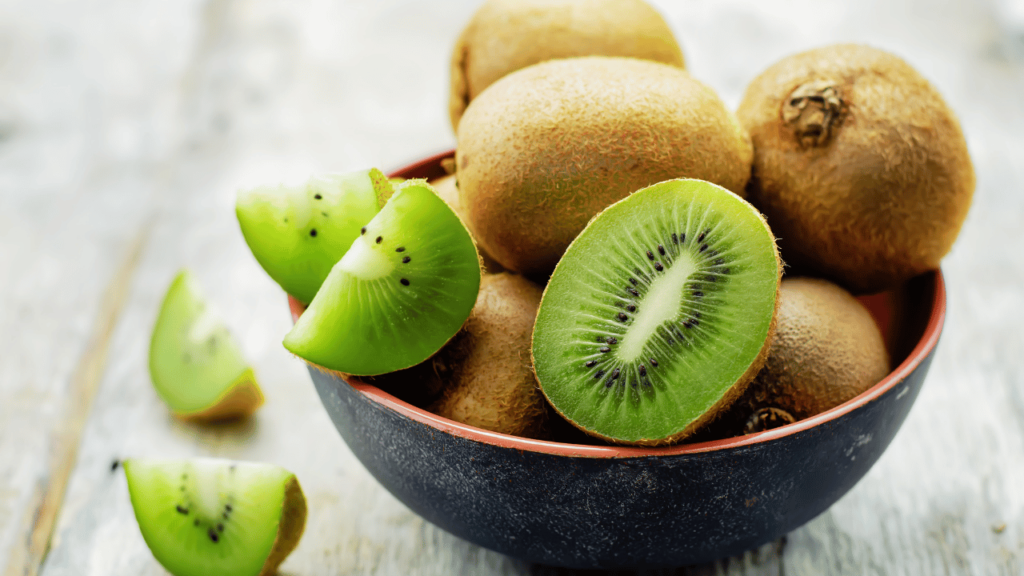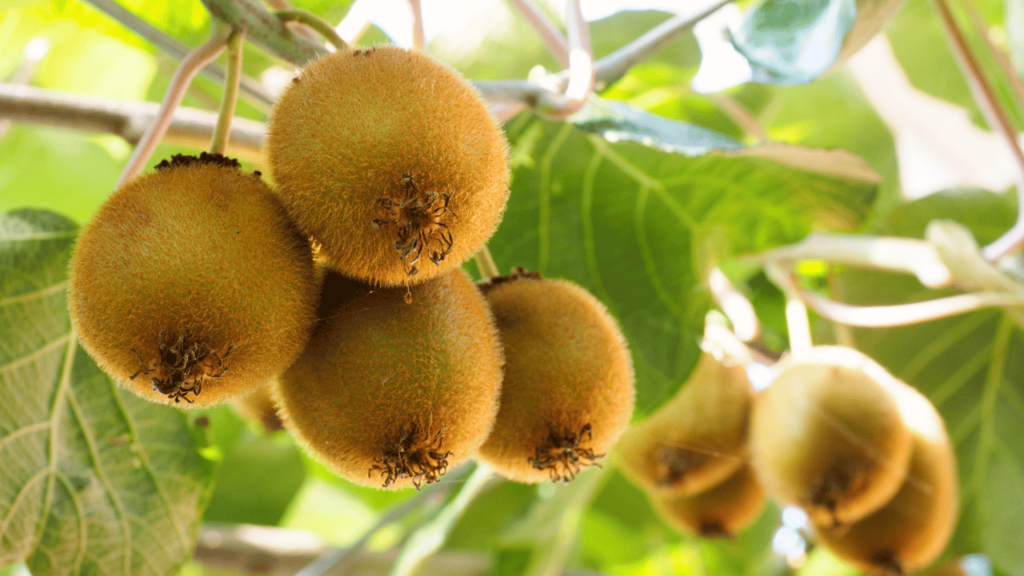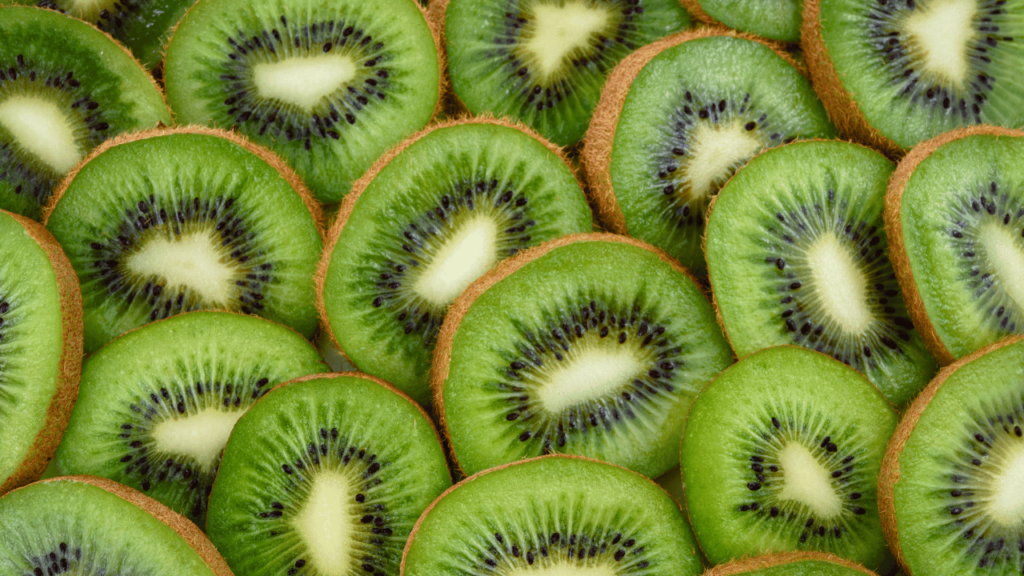Fresh Kiwi Fruit,health benefits and side effects in 2023
Fresh Kiwi Fruit
Fresh Kiwi fruit, also known as kiwifruit or simply kiwi, is a small oval-shaped fruit with a fuzzy brown exterior and vibrant green flesh inside.. Kiwi fruit has a unique tangy and sweet flavor, often described as a combination of strawberry, banana, and melon. It is rich in nutrients like vitamin C, vitamin K, vitamin E, and dietary fiber. Kiwi fruit is often enjoyed by itself or used in salads, smoothies, desserts, and even savory dishes. Its distinct taste and nutritional benefits make it a popular choice among fruit lovers.

How Kiwi Fruit Grow on kiwi Tree?
Kiwi fruit grows on vines, similar to grapes. The plants require well-drained soil and plenty of sunlight to thrive. Male and female kiwi plants are needed for pollination and fruit production. The male plants produce pollen, while the female plants produce flowers that eventually turn into fruit. Bees and other pollinators help transfer pollen from the male flowers to the female flowers. Once pollinated, the fruit begins to develop and grow. It takes several months for the kiwi fruit to ripen and be ready for harvest. During this time, it’s important to provide proper care, including regular watering, pruning, and protection from pests. It’s fascinating to see how these delicious fruits grow.

Cultivation of Kiwi Fruit
Fresh Kiwi fruit is found mostly in countries with a suitable climate for its cultivation. Some of the major kiwi fruit-producing countries include New Zealand, China, Italy, and Chile. These countries have the suitable environment for the growth of kiwi fruit. New Zealand, in particular, is renowned for its high-quality kiwi fruit production. Kiwi fruit is also grown in United States, France, Greece, and Australia. It’s amazing how this delicious fruit is grown in different corners of the globe
Types Of Kiwi Fruit
Here are the types of kiwi fruit:
- Green Kiwi (Hayward Kiwi): This is the most common type with a brown, fuzzy skin and vibrant green flesh.
- Golden Kiwi: It has a smooth, bronze skin and a sweeter flavor compared to the green kiwi.
- Baby Kiwi (Kiwi Berry): These are small kiwis about the size of a grape, with a smooth skin that can be eaten without peeling.
These are just a few examples, but there are many more types of kiwi fruit out there. It’s fun to explore the different flavors and textures they offer
Health Benefits Of Kiwi
Fresh Kiwi fruit is not only delicious but also packed with a variety of health benefits! Here are some of the benefits of kiwi fruit:
- High in Vitamin C: Kiwi fruit is known for its high vitamin C content, which helps support a healthy immune system and collagen production.
- Rich in Antioxidants: Kiwi fruit is loaded with antioxidants, which help protect the body against free radicals and oxidative stress.
- Good Source of Fiber: Kiwi fruit is a great source of dietary fiber, which can help support digestion and promote a healthy gut.

- Supports Heart Health: Kiwi fruit contains potassium, which is essential for maintaining a healthy heart and blood pressure levels.
- Boosts Digestive Health: The enzymes present in kiwi fruit, such as actinidin, aid in the digestion of proteins and can help alleviate digestive issues.
- Promotes Skin Health: The combination of vitamin C and antioxidants in kiwi fruit can contribute to healthy skin by promoting collagen synthesis and protecting against skin damage.
- Supports Eye Health: Kiwi fruit contains lutein and zeaxanthin, which are beneficial for eye health and may help protect against age-related macular degeneration.
These are just a few of the many benefits that kiwi fruit can offer. It’s a tasty and nutritious addition to your diet
Dishes Of Kiwi Fruit
Fresh Kiwi fruit is often enjoyed on its own as a fresh and healthy snack, but it can also be used in various dishes to add a unique touch. Here are a few famous dishes that incorporate kiwi fruit:
- Kiwi Fruit Salad: Kiwi fruit makes a refreshing addition to fruit salads, adding a vibrant color and a tangy flavor.
- Kiwi Fruit Smoothie: Blend kiwi fruit with other fruits, yogurt, and a splash of juice for a delicious and nutritious smoothie.
- Kiwi Fruit Salsa: Dice kiwi fruit along with other ingredients like tomatoes, onions, and cilantro to create a flavorful salsa that pairs well with grilled meats or as a dip with tortilla chips.
- Kiwi Fruit Tart: Use sliced kiwi fruit as a topping for a sweet tart, either on its own or combined with other fruits like strawberries or blueberries.
- Kiwi Fruit Sorbet: Freeze pureed kiwi fruit with a little sugar and lemon juice to create a refreshing and naturally sweet sorbet.
These are just a few examples, but kiwi fruit are also used in a number of dishes all over the world. Feel free to get creative and experiment with different dishes using kiwi fruit.
Side Effects Of Kiwi Fruit
Fresh Kiwi fruit is generally considered safe for consumption by most people. However, it is possible that some individuals may experience side effects or allergic reactions after consuming it. It is important to keep in mind the following potential side effects:
- Allergic Reactions: Some people may be allergic to kiwi fruit, which can cause symptoms such as itching, swelling, hives, or difficulty breathing. If you have known allergies to other fruits, it’s best to consult with a healthcare professional before consuming kiwi fruit.
- Oral Allergy Syndrome: Kiwi fruit belongs to a group of fruits that can trigger oral allergy syndrome in some individuals. This can cause itching or swelling in the mouth, lips, or throat after consuming kiwi fruit.
- Digestive Issues: Kiwi fruit contains a natural enzyme called actinidin, which can sometimes cause digestive discomfort or an upset stomach, especially when consumed in large quantities.
- Interactions with Medications: Kiwi fruit may interact with certain medications, such as blood thinners or medications for high blood pressure. If you are taking any medications, it is recommended that you consult with your healthcare provider before adding kiwi fruit to your diet.
It’s important to note that these side effects are relatively rare, and most people can enjoy kiwi fruit without any issues. However, if you experience any adverse reactions after consuming kiwi fruit, it’s best to stop consuming it and consult with a healthcare professional.